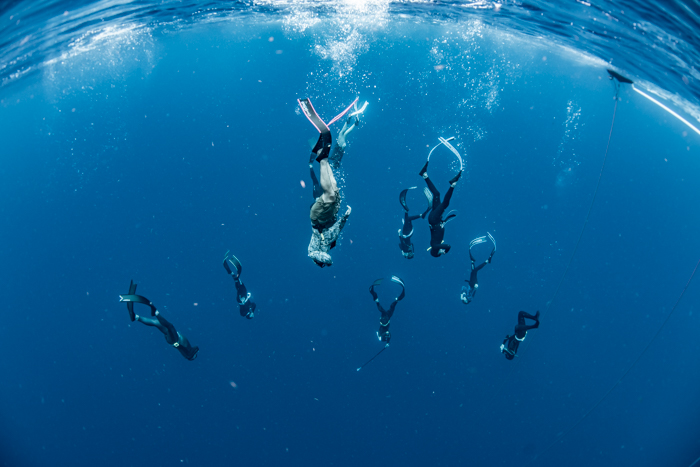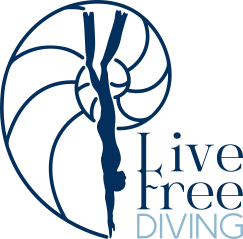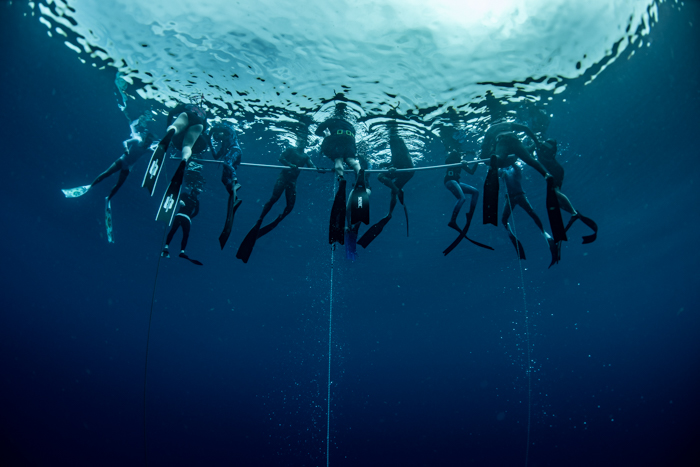What is Freediving?

What is Freediving?
At its core, freediving is breath-hold diving. It’s the practice of diving underwater without the aid of tanks, relying solely on your breath and your body’s natural ability to hold it. While it sounds simple, it’s actually a deep, mindful experience that requires training, technique, and a connection to the water.
There are three primary types of freediving:
- Pool Training: In a controlled environment, freedivers practice breath-hold times and distances to improve their stamina and lung capacity. This type of training focuses on relaxation and building foundational skills.
- Line Diving: In open water, freedivers dive down a weighted line to reach depth, improving their technique and comfort in the deeper parts of the ocean. It’s perfect for those aiming to push their depth limits.
- Recreational Freediving: This is where most beginners start. It’s all about exploring the ocean, encountering marine life, and having fun while improving your breath-holding and diving technique. Whether you’re snorkeling or diving deeper, recreational freediving lets you experience the underwater world like never before.

Learn more about our freediving courses here.
Who Are Freedivers?
Freedivers come from all walks of life. From beginners just dipping their toes into the water to seasoned professionals competing in depth-based competitions, freediving is a sport for everyone. And the best part? You don’t have to dive to great depths to be considered a freediver.
- Freedivers range from beginners to competition level.
- You don’t have to dive deep to be a freediver.
- Snorkeling is the most simple form of freediving.
- Freediving is far more accessible than SCUBA diving.
- Almost anyone can become a freediver, regardless of age, race, or size.
The beauty of freediving lies in its accessibility. Anyone with an interest in the ocean, whether you’re young or old, can enjoy it and progress at their own pace. Freediving is less about the depth of your dives and more about the personal experience and connection you create with the water.
Why Do People Freedive?
There are many reasons why people take up freediving, and it’s not just about going deeper or diving longer. Freediving provides countless benefits for the mind, body, and soul:
- Competition: Some freedivers compete to reach incredible depths or hold their breath the longest. The competitive side of freediving can be intense and exhilarating, pushing divers to challenge their own limits.
- Fun and Exploration: Freediving allows people to explore the underwater world in ways that snorkeling or scuba diving can’t match. It’s about the thrill of discovery and seeing marine life up close in their natural habitat.
- Modeling and Artistic Expression: Many freedivers become models or use the sport to create breathtaking underwater art. Freediving offers unique opportunities for photographers, videographers, and artists to capture the beauty of the ocean.
- For Food (Spearfishing): Spearfishing is one of the most rewarding aspects of freediving, where divers hunt for food sustainably, using only their breath and a spear. It’s a unique way to experience the ocean and provide for oneself.
- Mindful Movement: Freediving is also a form of mindful movement. It teaches relaxation, control, and presence. The deep breathing and focus involved in freediving can have meditative effects and help reduce stress.
- Breathwork: Freediving is deeply tied to breath control. Practicing breath-holding techniques improves lung capacity and overall well-being, benefiting both physical and mental health.

Check out our upcoming freediving trips and adventures here.
Where Do People Freedive?
Freediving isn’t limited to the ocean. You can practice in many different environments where there is water deep enough to dive safely:
- Pools: Perfect for beginners and those working on technique or breath-holding.
- Oceans: The ideal spot for those looking to explore marine life and challenge themselves with deeper dives.
- Lakes and Springs: These freshwater environments offer clear, peaceful waters and great diving opportunities.
- Quarries: Often overlooked, quarries provide unique diving experiences, with calm waters and submerged structures to explore.
- Any Body of Water with Depth: As long as the water is deep enough and safe for diving, you can freedive anywhere.
Freediving offers the flexibility to explore various water bodies, depending on what you’re looking for, whether it’s to dive into vibrant coral reefs or explore a peaceful lake.

Discover some of our favorite freediving locations here.
When Do People Freedive?
While most people associate freediving with warm summer months, the sport can be enjoyed year-round. Many freedivers spend the summer months diving in the ocean, chasing the warmth of the sun. But once the colder months hit, some divers switch to pool training or dry training to keep improving their skills.
- Mostly in summer: This is the peak season for freediving, as warm weather and calm seas make for perfect conditions.
- Chasing summer year-round: Some freedivers travel to warmer locations or dive in controlled environments during the offseason.
- Training during the offseason: Many freedivers use the off-season to work on breath-holding, technique, and mental training, keeping their skills sharp for the next dive season.

How Do You Freedive?
Getting started with freediving is easier than you might think. Here’s how you can dive in:
- Take a Course: The best way to begin your freediving journey is by taking a certified course from a professional instructor. Courses teach you essential safety measures, techniques, and breathing exercises, making you a more confident and knowledgeable diver. Sign up for one of our courses today.
- Join a Community: Freediving is more enjoyable when you’re part of a supportive community. Whether you’re training in a group or sharing your experiences with fellow divers, a community helps you grow and stay motivated.
- Practice Technique and Breath-Holding: The key to freediving is practice. With time and patience, you’ll improve your breath-holding capacity and technique, which are crucial for more advanced dives.
- Go on a Freediving Trip: The best way to experience freediving is by going on a trip. Whether it’s a local adventure or a far-off destination, a freediving trip offers new challenges, unique marine life, and unforgettable memories. Join us on an unforgettable freediving trip.

Ready to Dive In?
Freediving is a thrilling and transformative sport that offers not only an adventure under the sea but also the chance to connect with yourself and others. Whether you’re looking to improve your technique, explore new places, or meet like-minded ocean lovers, we have something for everyone. So why not take the first step toward your freediving journey?
Explore our freediving courses, join us on an epic trip, and become part of our vibrant community of divers today!

